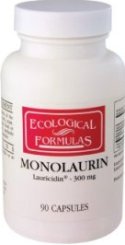Monolaurin - 300 MG - 90 CP
Monolaurin by Ecological Formulas, Cardiovascular Research
is a monoglyceride comprised of lauric acid and glycerol.Monolaurin possesses anti-viral activity against several Viruses that reside in cell membranes (it prevents their entry into cell membranes). Monolaurin attacks the lipid membrane of the Herpes simplex and Herpes zoster Viruses [in vitro research]. Monolaurin attacks the lipid membrane of Influenza Viruses [in vitro research].
As the HIV Virus (responsible for AIDS) is also a Virus that resides in the cell membrane, it is possible that Monolaurin may also be effective against this Virus [this has not yet been tested: it is a scientific theory only]
This is a powerful antiviral, tested successfully for herpes types I and II, as well as non-specific viral infections. It contains the monoester of the acid lauric acid. Monolaurin has had good results in studies of Shingles, Herpes virus and Epstein Bar virus, which is closely related to the herpes virus. Monolaurin-based creams are being developed.
In addition to the commonly known supplements Vitamin D, Lactoferrin and Echinacea, physicians recommend taking several capsules of Monolaurin on an empty stomach. Doctors. overprescribe antibiotics which will not work for viral infections.
Monolaurin is a more judicious prescription for cold and flu. Viral diseases result from a series of growth cycles that kill or alter cells. The maximal goal of antiviral treatment is to restore function to the infected cells, stop viral replication and thus prevent spread to additional cells. The difficulty is inhibition of the virus without harming the body's cells. Diseases may become evident only after extensive viral multiplication and cellular alteration have occurred. Thirdly, antiviral therapy can result in resistant mutation.
Monolaurin is an exciting product because of its antiviral properties that enable selective use of a non-toxic agent to humans. Monolaurin works directly on the envelope coat of the virus by disrupting the conformation of the lipid bilayer, preventing adsorption (attachment) to host cells. It does not upset the gastrointestinal tract. No significant effect was noted in liver enzymes, leukocyte count, red cell count or hemoglobin levels in studies.
Not only does Monolaurin exert antiviral activity by direct activity, it also enhances both nonspecific as well as specific host defenses against viral invasion. It does not have an effect on lymphocyte or macrophage functions. It potentiates immunological activity by triggering agents as mitogens, antigens, phagocytic stimuli or lymphokines. Although it is broad spectrum, it has no effect on disease caused by polio, Coxsackie, rotaviruses, Western euine, Venezuela equine or Japanese B encephalitis.
Note: Some physicians recommend taking 6 capsules when one has a flare up of the herpes virus, and two capsules as a maintenance dose. Sometimes the herpes virus can be activated by Monolaurin, and then killed, resulting in a Herxheimer-like reaction where one feels worse before feeling better.
Monolaurin is effective against yeast and fungi, staphylococcus aureus (staph) and streptococcus agalactiae (strep), chlamydia trachomatis, candida albicans, giardia lamblia, ringworm, H. pylori and gonorrhea.
In studies performed at the Respiratory Virology Branch, Centers for Disease Control, Monolaurin was shown to remove all measurable infectivity against the following RNA and DNA viruses:
Herpes Simplex 1 and 2
Epstein-Barr
Bronchitis
Influenza
Respiratory Syncytial Virus
Rubeola
Newcastle's
Cytomegalovirus
Directions
A therapeutic dose of monolaurin is generally 1800mg to 2400mg per day.


